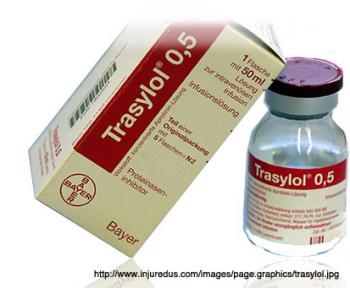Trasylol Lawsuit
A Brief Guide to Filing a Trasylol Lawsuit:
What is Trayslol?
Manufactured by Bayer HealthCare, Trayslol is a medical injection drug intended to prevent blood loss. It was typically administered in patients undergoing cardiopulmonary bypass surgery—the drug was effective in mitigating blood spillage during surgeries. However, because of its link to stoke, heart attack and kidney failure, Trayslol was eventually pulled from U.S. markets.
On February 8th of 2006, the United States Food and Drug Administration issued a Public Health Advisory for the drug following the conclusion of two observational studies that affirmed a link between the injection and the aforementioned Trayslol side effects.
In addition to these observations, the New England Journal of Medicine concluded that the drug was associated with other severe Trayslol side effects. Trayslol was on the market for nearly 15 years. During this time, studies have linked the drug to thousands of patient deaths. In addition to these severe Trayslol side effects, numerous Trayslol lawsuits were filed against Bayer for aggressively marketing the drug.
Trayslol Side Effects and FDA Regulations:
In 2007, Bayer (maker of Trayslol) suspended marketing until final results of a randomized reial in a cardiac surgery population was finalized. This study ultimately revealed an increase in the risk of death with Trayslol use when compared with tranexamic acid and aminocaproic acid. In response to these results, the Food and Drug Administration will review this data and reassess the status and access to the product once all information is affirmed.
The FDA recently updated Trayslol’s label to better reflect increased risks of renal dysfunction and anaphylactic reactions. The new label also states that Trayslol is indicated for use only in patients who face an increased risk for blood loss and transfusions in association with cardiopulmonary bypass. Trayslol should only be administered in the operative setting where cardiopulmonary bypass can be initiated.
Trayslol Lawsuits:
The injection drug was withdrawn from the market in 2007 because of increasing concerns of Trayslol side effects. Though many patients have filed Trayslol lawsuits, it is probably too late—because of local statutes of limitations--to seek a Trayslol settlement at this point.
As mentioned above, the 2006 study undertaken by the New England Journal of Medicine noted that the drug was successful at controlling bleeding during surgery. However, the report also noted that Trayslol side effects included a 181% greater risk of stroke and a 55% greater chance of kidney failure—these Trayslol side effects statistics derive from comparisons to the study’s control group (individuals not using Trayslol.
As a result of their investigation, the FDA found that manufacturer Bayer had not reported the results of a study indicating that the drug could increase the risk of death. The FDA, in response to its findings, issued a warning regarding Trayslol side effects and instructed surgeons to only use the medication if its ability to control bleeding was greater than its risks. The agency ultimately chose not to forego a Trayslol lawsuit.
In response to increasing concerns of Trayslol side effects—and to mitigate damage associated with Trayslol lawsuits-- Bayer withdrew the drug from the market in November 2007. Following its removal, many former users filed Trayslol lawsuits to offset the costs associated with Trayslol side effects—these Trayslol lawsuits sought punitive damages for lost wages due to missed work, pain and suffering and medical costs.
The precise figures concerning the number of people receiving Trayslol settlements has not been publicized. In August 2010; however, it was reported that Bayer had paid $60 million to resolve 150 Trayslol lawsuits. The volume of people filing a Trayslol lawsuit was reported to be as high as 1600. To expedite litigation efforts, multidistrict litigation was established; this procedure brought every Trayslol lawsuit under the jurisdiction of a Florida federal court.
Since 2010, there is a dearth of reports concerning Trayslol lawsuits. Just recently, opted to forego the creation of a mass settlement fund and instead resolve every Trasylol lawsuit on a case-by-case basis. However, the multidistrict litigation to hear Trayslol lawsuits has been dissolved. As a result, anyone who wishes to pursue a Trasylol lawsuit must do so in their own district.
By this point, it may be too late to seek compensation regarding Trasylol side effects. If you wish to consult a lawyer about the possibility of seeking a Trasylol settlement, you must check that the statute of limitations in your state has not expired. Should this be the case, you will need medical records of all Trasylol side effects. Such documents are fundamental to Trasylol lawsuits.
Sources:
1. http://www.fda.gov/drugs/drugsafety/
postmarketdrugsafetyinformationforpatientsandproviders/ucm142720.htm
2. http://health.usnews.com/usnews/
health/healthday/071105/trasylol-pulled-from-worldwide-market.htm
Related Topics
- Lipitor Lawsuit
- Meridia Lawsuit
- Accutane Lawsuit
- Celexa Lawsuit
- Mirapex Lawsuit
- Tequin Lawsuit
- Chantix Lawsuit
- Avandamet Lawsuit
- Risperdal Lawsuit
- Viagra Lawsuit
